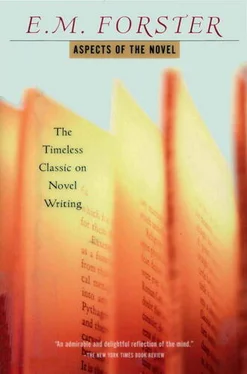So Strether changes sides and loses all hopes of marrying Mrs. Newsome. Paris is winning—and then he catches sight of something new. Is not Chad, as regards any fineness in him, played out? Is not Chad's Paris after all just a place for a spree? This fear is confirmed. He goes for a solitary country walk, and at the end of the day he comes across Chad and Mme. de Vionnet. They are in a boat, they pretend not to see him, because their relation is at bottom an ordinary liaison, and they are ashamed. They were hoping for a secret week-end at an inn while their passion survived; for it will not survive, Chad will tire of the exquisite Frenchwoman, she is part of his fling; he will go back to his mother and make the little domestic article and marry Mamie. They know all this, and it is revealed to Strether though they try to hide it; they lie, they are vulgar—even Mme. de Vionnet, even her pathos, once so exquisite, is stained with commonness.
It was like a chill in the air to him, it was almost appalling, that a creature so fine could be, by mysterious forces, a creature so exploited. For, at the end of all things, they were mysterious; she had but made Chad what he was—so why could she think she had made him infinite? She had made him better, she had made him best, she had made him anything one would; but it came to our friend with supreme queerness that he was none the less only Chad. The work, however admirable, was nevertheless of the strict human order, and in short it was marvellous that the companion of mere earthly joys, of comforts, aberrations—however one classed them—within the common experience, should be so transcendently prized.
She was older for him tonight, visibly less exempt from the touch of time; but she was as much as ever the finest and subtlest creature, the happiest apparition, it had been given him, in all his years, to meet; and yet he could see her there as vulgarly troubled, in very truth, as a maidservant crying for a young man. The only thing was that she judged herself as the maidservant wouldn't; the weakness of which wisdom too, the dishonour of which judgment, seemed but to sink her lower.
So Strether loses them too. As he says: "I have lost everything—it is my only logic" It is not that they have gone back. It is that he has gone on. The Paris they revealed to him—he could reveal it to them now, if they had eyes to see, for it is something finer than they could ever notice for themselves, and his imagination has more spiritual value than their youth. The pattern of the hour-glass is complete; he and Chad have changed places, with more subtle steps than Thais and Paphnuce, and the light in the clouds proceeds not from the well-lit Alexandria, but from the jewel which "twinkled and trembled and melted together, and what seemed all surface one moment seemed all depth the next."
The beauty that suffuses The Ambassadors is the reward due to a fine artist for hard work. James knew exactly what he wanted, he pursued the narrow path of aesthetic duty, and success to the full extent of his possibilities has crowned him. The pattern has woven itself with modulation and reservations Anatole France will never attain. Woven itself wonderfully. But at what sacrifice!
So enormous is the sacrifice that many readers cannot get interested in James, although they can follow what he says (his difficulty has been much exaggerated), and can appreciate his effects. They cannot grant his premise, which is that most of human life has to disappear before he can do us a novel.
He has, in the first place, a very short list of characters. I have already mentioned two—the observer who tries to influence the action, and the second-rate outsider (to whom, for example, all the brilliant opening of What Maisie Knew is entrusted). Then there is the sympathetic foil—very lively and frequently female—in The Ambassadors. Maria Gostrey plays this part; there is the wonderful rare heroine, whom Mme. de Vionnet approached and who is consummated by Milly in The Wings of the Dove; there is sometimes a villain, sometimes a young artist with generous impulses; and that is about all. For so fine a novelist it is a poor show.
In the second place, the characters, beside being few in number, are constructed on very stingy lines. They are incapable of fun, of rapid motion, of carnality, and of nine-tenths of heroism. Their clothes will not take off, the diseases that ravage them are anonymous, like the sources of their income, their servants are noiseless or resemble themselves, no social explanation of the world we know is possible for them, for there are no stupid people in their world, no barriers of language, and no poor. Even their sensations are limited. They can land in Europe and look at works of art and at each other, but that is all. Maimed creatures can alone breathe in Henry James's pages—maimed yet specialized. They remind one of the exquisite deformities who haunted Egyptian art in the reign of Akhenaton—huge heads and tiny legs, but nevertheless charming. In the following reign they disappear.
Now this drastic curtailment, both of the numbers of human beings and of their attributes, is in the interests of the pattern. The longer James worked, the more convinced he grew that a novel should be a whole—not necessarily geometric like The Ambassadors, but it should accrete round a single topic, situation, gesture, which should occupy the characters and provide a plot, and should also fasten up the novel on the outside—catch its scattered statements in a net, make them cohere like a planet, and swing through the skies of memory. A pattern must emerge, and anything that emerged from the pattern must be pruned off as wanton distraction. Who so wanton as human beings? Put Tom Jones or Emma or even Mr. Casaubon into a Henry James book, and the book will burn to ashes, whereas we could put them into one another's books and only cause local inflammation. Only a Henry James character will suit, and though they are not dead—certain selected recesses of experience he explores very well—they are gutted of the common stuff that fills characters in other books, and ourselves. And this castrating is not in the interests of the Kingdom of Heaven, there is no philosophy in the novels, no religion (except an occasional touch of superstition), no prophecy, no benefit for the superhuman at all. It is for the sake of a particular aesthetic effect which is certainly gained, but at this heavy price.
H. G. Wells has been amusing on this point, and perhaps profound. In Boon —one of his liveliest works—he had Henry James much upon his mind, and wrote a superb parody of him.
James begins by taking it for granted that a novel is a work of art that must be judged by its oneness. Some one gave him that idea in the beginning of things and he has never found it out. He doesn't find things out. He doesn't even seem to want to find things out. He accepts very readily and then—elaborates. . . . The only living human motives left in his novels are a certain avidity and an entirely superficial curiosity. . . . His people nose out suspicions, hint by hint, link by link. Have you ever known living human beings do that? The thing his novel is about is always there. It is like a church lit but with no congregation to distract you, with every light and line focussed on the high altar. And on the altar, very reverently placed, intensely there, is a dead kitten, an egg shell, a piece of string. . . . Like his Altar of the Dead with nothing to the dead at all. . . . For if there was, they couldn't all be candles, and the effect would vanish.
Wells sent Boon as a present to James, apparently thinking the master would be as much pleased by such heartiness and honesty as was he himself. The master was far from pleased, and a most interesting correspondence ensued. [10] See the Letters of H. James, Vol. II.
Each of the eminent men becomes more and more himself as it proceeds. James is polite, reminiscent, bewildered, and exceedingly formidable: he admits that the parody has not "filled him with a fond elation," and regrets in conclusion that he can sign himself "only yours faithfully, Henry James." Wells is bewildered too, but in a different way; he cannot understand why the man should be upset. And, beyond the personal comedy, there is the great literary importance of the issue. It is this question of the rigid pattern: hour-glass or grand chain or converging lines of the cathedral or diverging lines of the Catherine wheel, or bed of Procrustes—whatever image you like as long as it implies unity. Can it be combined with the immense richness of material which life provides? Wells and James would agree it cannot, Wells would go on to say that life should be given the preference, and must not be whittled or distended for a pattern's sake. My own prejudices are with Wells. The James novels are a unique possession and the reader who cannot accept his premises misses some valuable and exquisite sensations. But I do not want more of his novels, especially when they are written by someone else, just as I do not want the art of Akhenaton to extend into the reign of Tutankhamen.
Читать дальше












